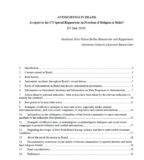Fonte:
https://www.ohchr.org
Autore:
Neubiana Silva Veloso Beilke, Giovanna Comacio
Antisemitism in Brazil
- INTRODUCTION
The purpose of this document is to report facts as well as general and specific aspects related to antisemitism in Brazil, focusing on current incidents, and to cover the main issues requested in the invitation to provide input made by Dr. Ahmed Shaheed, for submission to the United Nations (UN). This report has an academic nature and contextualizes the problem related to antisemitism in Brazil, presents information on antisemitic incidents and on laws and policies involving the topic, the State’s responses to antisemitism arising at the national level, and the best practices of non-state actors in addressing the problem, such as: Non-Governmental Organizations (NGOs), Jewish associations and Israeli confederations in Brazil. Such institutions shall act in favor of the dissemination of educational and enlightening information on Jewish culture to prevent discrimination, to counter antisemitic behaviors and the dissemination of a ‘culture of hatred’.
According to data compiled by the Instituto Brasileiro de Geografia e Estatística – IBGE (Brazilian Institute of Geography and Statistics), in the population census conducted in 2010, there were 107,329 Jews in Brazil. According to Schwartzman’s research (1999), it is estimated that more than 100 thousand people are practicing the Jewish religion in Brazil, although there are no more precise data on non-practitioners. According to the sociologist, about 400,000 people interviewed in Brazil claimed to be descendants of Jews. Among the languages spoken by these Jews and some of their descendants, we can list Portuguese, Hebrew, Yidish, German, Polish, Russian and Hakkiah. Among the Jewish ethnic divisions, we can find mainly Ashkenazim, Sefaradim, Mizrahim.
Regarding the definition of antisemitism, we adopted the one presented by the Israeli Confederation of Brazil (Conib), ‘opposition to peoples of Semitic origin’, which includes Arab Semites. The word has been used in reference to thoughts, conspiracies, discriminatory actions and even violent acts against the Jews, their faith, culture and descendants. The origin of the term dates back to 1879 and its authorship is attributed to the German philosopher Wilhelm Marr, who described hatred for Jews in his research. The ‘culture of hatred’ towards the Semites also involves economic aspects and has gained contours from political movements and acts that have historically resulted in segregation of Jews in the world and violent contours on the part of civil society also in Brazil.
In the perspective of the relations of ethnic and religious discrimination, there is an anti-Zionism, defined by Conib as an ideology that aims to delegitimize the existence of the state of Israel. For the Confederation, Zionism is the product of an endogenous and legitimate historical process of national aspiration that has been facing opposition in the sense of blaming Israel for evils that devastate the world, attributing alleged conspiracies and instigating attacks on Jews and Jewish symbols in several countries.
Zionism is a political movement that defends the right to self-determination of the Jewish people in a Jewish state. It gained strength at the end of the 19th century, driven by the advance of antisemitism. The name Zionism derives from Zion, an important mountain located around Jerusalem, and represents the historical yearning of the Jewish people, for over a millennium, to return to the land of their biblical ancestors after forced exile. His political organization gained momentum in 1897 with the holding of the first World Zionist Congress. In its religious aspect, Zionism is the defense of the precepts of Judaism and Torah. This doctrine defends that the return of the Jews to Israel has theological significance, that is, it represents the beginning of the divine redemption, whose peak will be the coming of the Messiah. Religious Zionism defends the principle that the Land of Israel was given to the Jews by God, and therefore the people’s right to the land is permanent and inalienable.
The political aspect of Zionism can be seen as the most relevant. Based on the study of Matos (2013), we can say that the Zionist movement has existed for approximately 125 years, its main creator was Theodoro Hertzl. The existence and creation of the State of Israel took place right after the Second World War, with the Holocaust as its culmination, an episode that represented the annihilation of a third of the Jewish people.
IN ALLEGATO IL REPORT COMPLETO


